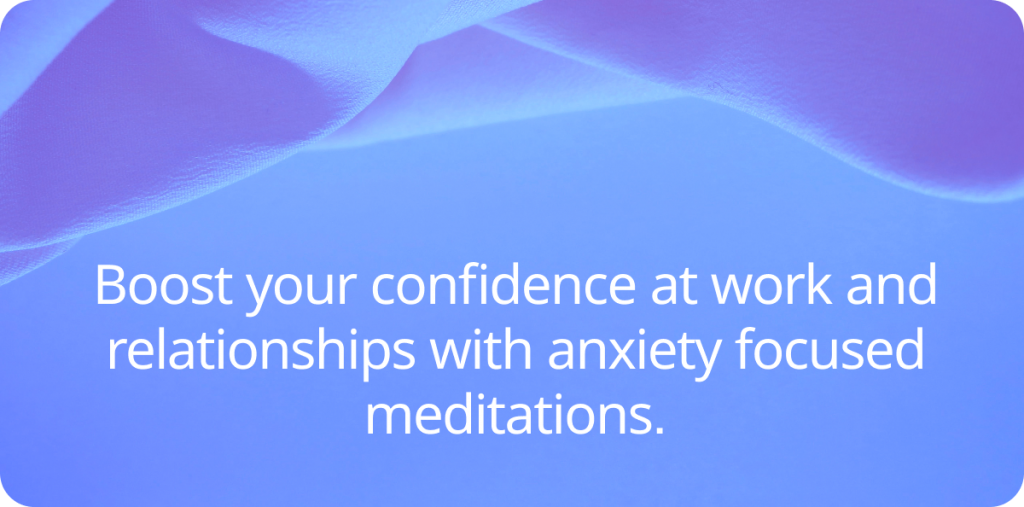How To Be More Confident In Relationships, Work And Social Contexts

Table of contents
Which of these contexts are you usually involved in: 1) Being afraid to speak your mind at work 2) Avoiding meeting new people for fear of judgment 3) Not showing who you truly are in front of your partner. If any of those three scenarios make you feel anxious, you are here to learn how to be more confident.
Whether it’s a matter of shyness, social or work anxiety, in this article, we’ll delve into practical strategies and tips to help you boost your confidence levels effectively.

How To Overcome Shyness: Understanding Shyness And Confidence
Confidence, at its core, is a deep belief in oneself and one’s abilities. It’s the inner assurance that allows individuals to navigate life’s challenges with poise and resilience. Defined by a sense of self-assuredness and belief in one’s capabilities, confidence serves as a guiding force in various aspects of life.
Contrary, shyness is a common and natural human emotion characterized by feelings of discomfort, nervousness, or apprehension in social situations or when interacting with others. Individuals who experience shyness may feel self-conscious, insecure, or hesitant to engage in social interactions, particularly with unfamiliar people or in unfamiliar environments.

Confidence In Social Contexts
In social contexts, confidence enables individuals to engage with others authentically, fostering meaningful connections and relationships. Whether it’s striking up a conversation with a stranger or speaking up in a group setting, social confidence empowers individuals to navigate social interactions with ease and grace.
Confidence In The Workplace
Similarly, in the workplace, confidence plays a pivotal role in career advancement and success. Confident individuals are more likely to assert themselves, take on leadership roles, and pursue opportunities for growth and development. From presenting ideas in meetings to negotiating for promotions, confidence is a cornerstone of professional achievement.
Confidence In Relationships
Moreover, confidence is essential in nurturing healthy and fulfilling relationships. It allows individuals to communicate effectively, express their needs and desires, and maintain boundaries. In romantic relationships, confidence fosters trust, intimacy, and mutual respect, laying the foundation for a strong and lasting connection.
How To Overcome Shyness
It’s crucial to recognize its signs and understand how it manifests in your life. Common signs of shyness include avoiding social situations, feeling anxious or tense around others, struggling to initiate or maintain conversations, and experiencing physical symptoms like blushing, sweating, or trembling in social settings.
By identifying these signs, you can begin to understand the impact of shyness on your life and take proactive steps to address it.

Strategies to overcome shyness
- Building self-awareness: Start by reflecting on the root causes of your shyness and how it affects your thoughts, feelings, and behaviors. Journaling or seeking support from a therapist can help you gain insights into underlying fears or insecurities driving your shyness.
- Stepping out of comfort zones: Start small by setting achievable goals, such as initiating a conversation with a coworker or attending a social gathering with a trusted friend. As you gradually expand your comfort zone, you’ll build confidence and resilience in social settings.
- Practicing assertiveness: Assertiveness involves expressing your thoughts, feelings and needs in a clear, respectful manner while maintaining boundaries and advocating for yourself. Practice assertive communication techniques, such as using “I” statements, active listening, and standing up for yourself when necessary.
Our last suggestion on this matter would be to practice self-compassion. You are doing a lot by just reading this guide, and with the desire to overcome shyness. Take a mindful break with a meditation practice:
How To Be More Confident At Work
Assertiveness in the workplace
Assertiveness is a critical skill for boosting confidence and success in the workplace. It involves effectively expressing your thoughts, opinions and needs while respecting the rights and boundaries of others. Practice assertive communication by speaking up in meetings, offering constructive feedback, and advocating for yourself and your ideas. Remember to maintain a confident posture, make eye contact, and use assertive language to convey your message clearly and confidently.
Setting and achieving professional goals
Setting clear and achievable professional goals is another powerful way to boost confidence at work. Take the time to identify your strengths, interests, and career aspirations, and set SMART (Specific, Measurable, Achievable, Relevant, Time-bound) goals to guide your progress. Break down large goals into smaller, actionable steps, and celebrate each accomplishment along the way. By setting and achieving meaningful goals, you’ll build confidence in your abilities and create momentum for continued success.
Handling criticism and feedback constructively
Constructive feedback is essential for professional growth, but it can sometimes trigger feelings of self-doubt or insecurity. Learn to handle criticism and feedback constructively by adopting a growth mindset and viewing feedback as an opportunity for learning and improvement. Remember that receiving feedback is not a reflection of your worth as a person, but rather an opportunity to enhance your skills and performance.

How To Be More Confident In A Relationship
Effective communication
Practice active listening, empathy, and open communication to express your thoughts, feelings, and needs openly and honestly. Be attentive to verbal and nonverbal cues from your partner, and strive to understand their perspective without judgment or defensiveness. By fostering open and transparent communication, you’ll build trust, deepen emotional connection, and enhance confidence in your relationship.
Building trust and intimacy
Prioritize honesty, reliability, and consistency in your interactions with your partner to establish a strong foundation of trust. Invest time and effort in nurturing emotional intimacy through shared experiences, vulnerability, and mutual support. By cultivating trust and intimacy, you’ll create a safe and supportive environment where you can be yourself and express your true feelings without fear of judgment or rejection.
Setting boundaries and expressing needs
Take the time to identify your boundaries, values, and priorities, and communicate them clearly and assertively to your partner. Respect your partner’s boundaries and be receptive to their needs as well. Effective communication and boundary-setting foster mutual respect, autonomy, and trust, creating a strong sense of security and confidence in your relationship.

How to Be More Socially Confident
Active listening
Practice active listening by focusing on the speaker, maintaining eye contact, and providing verbal and nonverbal cues to show your interest and understanding. Avoid interrupting or formulating responses while the other person is speaking, and instead, focus on fully comprehending their message before offering your input.
Initiating conversations:
Initiating conversations can be daunting, but it’s a crucial skill for building social connections. Start by approaching others with a friendly smile and a genuine interest in getting to know them. Use open-ended questions to encourage conversation and show curiosity about the other person’s interests, experiences, and opinions.
Challenge negative thoughts
Identify and challenge irrational beliefs and negative self-talk that contribute to social anxiety. Replace negative thoughts with more realistic and positive ones, such as focusing on your strengths and past successes.
Oh, and one more tip before ending: You can’t be liked by everybody. And that’s okay. You are a wonderful person, and there’s always a community willing to welcome you in. Trust the process, support your boundaries, and take it step by step.
Final Thoughts
Building confidence is a journey, not a destination. It requires patience, persistence, and a willingness to step outside of your comfort zone. Embrace the process, celebrate your progress, and don’t be afraid to seek support when needed.
As you continue to cultivate confidence in every aspect of your life, may you discover the strength, courage, and resilience within yourself to pursue your goals, embrace new opportunities, and live authentically. Here’s to a future filled with confidence, growth, and endless possibilities.

